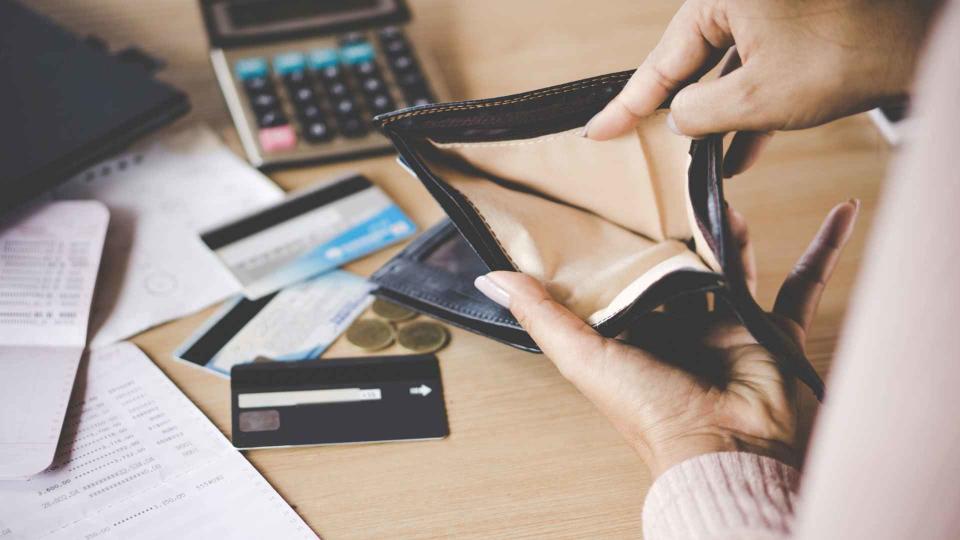8 Signs Your Financial Well-Being Is the ‘Worst It Has Ever Been’

How would you rate your financial well-being at this moment?
About a third of the 1,039 adult respondents to a recent GOBankingRates survey asking that question said their situation was “good but with work to do.” About 19% said it was neither good nor bad, and 28% responded “struggling but still getting by.”
About 9% had the unhappiest response, saying their financial situation is “the worst it has ever been.”
Check Out: I’m a Self-Made Millionaire, but I Still Opt For the Budget Versions of These 6 Items
Up Next: 4 Genius Things All Wealthy People Do With Their Money
“In today’s fast-paced world, maintaining financial well-being is crucial for a secure and stable life,” said behavioral economist Keisha Blair, an international bestselling author of the Holistic Wealth book series and founder of the Institute on Holistic Wealth. “However, many individuals may find themselves struggling with poor financial health without even realizing it. Recognizing the signs early on can empower individuals to take proactive steps towards financial stability.”
Here are eight signs your financial well-being is the worst it has ever been, according to Blair.

Lack of Financial Resilience
The No. 1 sign of poor financial health is a lack of financial resilience, Blair said.
“The signs of this include living paycheck to paycheck with absolutely no savings or investments or emergency funds,” Blair said. “Basically zero financial cushion.”
High debt that grows as you pay for necessities of life combines to create a situation that “borders on walking a road to financial ruin.”
Trending: 10 Things Frugal People Always Buy at Yard Sales To Save Money
For You: Mark Cuban Reveals Why He Keeps a Strict Budget Everyday
Wealthy people know the best money secrets. Learn how to copy them.

Consistent Overspending
Another one of the first signs of financial trouble is consistently spending more than you earn, Blair said.
“This happens from time to time with even very high income earners with savings and investments,” she said. “The problem lies when there’s the absence of a financial cushion and credit card balances are rising, and there’s a perpetual reliance on loans or credit lines to cover monthly expenses. Then it’s a huge red flag. Overspending can lead to a cycle of debt that is challenging to break and can lead to bankruptcy.”
Learn More: Nearly Half of Americans Struggle To Pay Their Utility Bills: 5 Ways To Save

Lack of Emergency Savings and Insurance
Blair said a stable financial profile includes an emergency fund that contains enough to cover at least six to nine months of expenses.
“If there’s little to no savings to cover unexpected expenses like medical bills or the death of a spouse, it indicates vulnerability to financial shocks,” she said. “Lack of emergency savings may force individuals into debt or disrupt their overall financial stability. This is compounded by a lack of adequate insurance policies including life insurance, disability insurance and critical illness insurance.”

High Debt-to-Income Ratio
“A high debt-to-income ratio, where a significant portion of income goes towards repaying debts, is a clear sign of financial strain,” Blair said. “If the debt load surpasses a manageable level, it can hinder the ability to save, invest or achieve financial goals.”

Frequent Late Payments
If late payments have become a common occurrence, it’s a sign that your financial well-being is not in good shape.
“Consistently missing bill due dates or making late payments can result in increased fees and interest charges,” Blair said. “This behavior not only negatively impacts credit scores but also signifies a struggle to manage cash flow effectively. When you frequently get [insufficient funds] charges in the $50 to $100 range because there [are] no funds in the bank account to cover bills … then it’s a sign.”
Good To Know: I’m a Frugal Self-Made Millionaire: 6 Things I Never Waste Money On

No Financial Plan or Budget
“Without a clear financial plan or budget, individuals may lack a road map for their financial future,” Blair said. “A well-structured budget helps allocate income wisely, prioritize expenses and identify areas for potential savings.”

Limited Investments or Retirement Savings
“Neglecting long-term financial goals, such as saving for retirement or investing for the future, can be detrimental,” Blair said. “A lack of investments may mean missing out on potential wealth growth and facing financial difficulties in retirement.”

Frequent Borrowing From Retirement Accounts
If you’re tapping into your retirement accounts for routine expenses, Blair said, it’s a concern.
“It not only jeopardizes future financial security but may also incur penalties and taxes, further exacerbating the financial strain,” she said.
“Recognizing the signs of poor financial health is the first step toward regaining control and building a secure financial future,” Blair said. “By addressing these signs head on, people can make informed decisions, implement effective financial strategies and work towards achieving lasting financial stability.”
More From GOBankingRates
In Less Than a Decade, You Won't Be Able To Afford Homes in These 20 Arizona ZIP Codes
These 10 Used Cars Will Last Longer Than an Average New Vehicle
This article originally appeared on GOBankingRates.com: 8 Signs Your Financial Well-Being Is the ‘Worst It Has Ever Been’

 Yahoo Finance
Yahoo Finance 